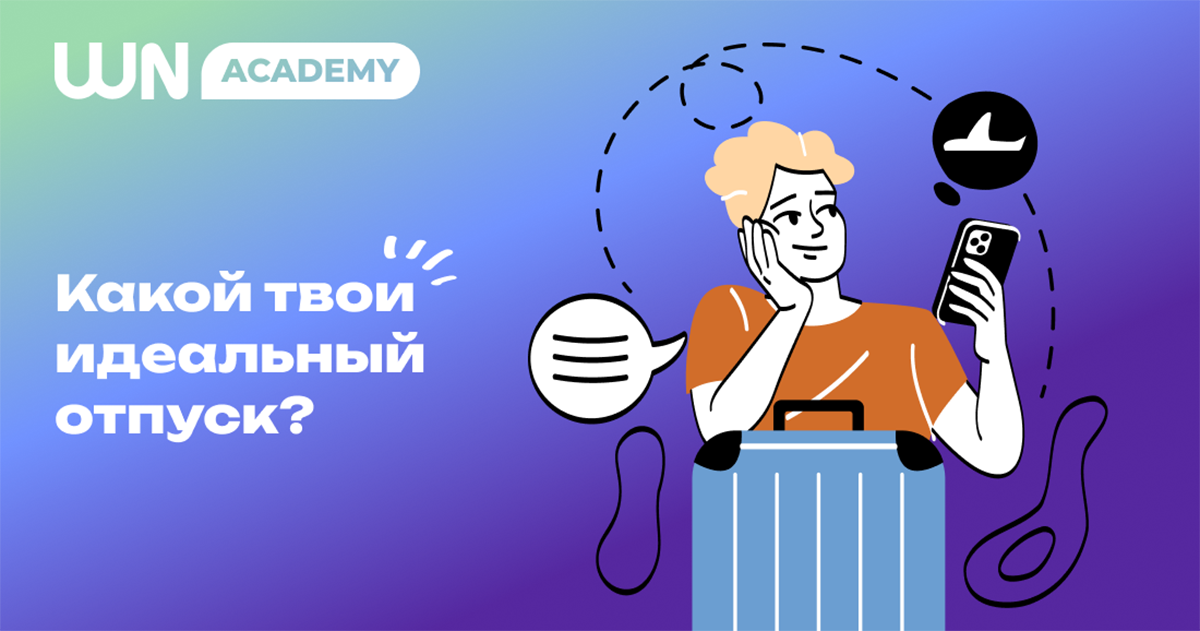Summer plans: to tan or to burn out? Why you shouldn't ignore vacation
Magdalena Stryevski, project manager at WN Academy, discusses the importance of taking a vacation, why you shouldn't ignore it, and how to plan your time off effectively.
Magdalena Stryevski
We live in an era where constant busyness and heavy workloads have become the norm. Technology is advancing, the environment is changing, decisions are made faster, and the scope of duties is growing and expanding. In these circumstances, some use every free minute to rest, while others never disengage from work processes, considering it unproductive.
However, vigilant researchers worldwide are sounding the alarm: the absence of vacations and constant overtime work significantly harm health. The World Health Organization has been studying the problem of mortality due to constant overwork for several years. The first major study conducted in 2016 showed that people working 55 hours a week or more are 35% more likely to suffer strokes and 17% more likely to develop cardiovascular diseases leading to death. The COVID era and global changes have only intensified this trend.
Nowadays, as the line between work and personal life blurs, these alarming data underscore the importance of taking a full break and rejuvenation regimen. Sometimes it's enough to take a couple of days, engage in a favorite hobby, get away to nature, or spend time with family, and return to work re-energized. However, determining when a couple of days are enough and when extended time is needed can be challenging.
Five Signs You Need a Longer Vacation
1. Frequent headaches and sleep issues.
Can't fall asleep, constantly waking up, and can't find peace even though you feel tired? Or are you sleeping more than usual but still don't feel rested? And headaches have become a constant backdrop in your life? This is an important signal to heed.
2. Decreased productivity and constant fatigue.
If it seems like even simple tasks drain your energy, and tasks no longer seem interesting, it's probably a good moment to plan a vacation.
3. Irritability.
Noise in the office, disrupted connections during online meetings, someone assigning tasks differently, deadlines shifting once more, and you realize that these evoke a stronger response in you than before. If a couple of days of rest don't help, and it only intensifies — it's a sure sign to consider a long vacation.
4. Problems with focus and attention.
Remember when they used to say as a kid, "Why are you counting crows?" If you notice you’re distracted by everything, can’t focus on a task for 30 minutes without interruption, and forget important details, it’s time to take a break.
5. Decreased interest in social interaction.
This will be more noticeable for extroverts, but introverts will understand when they not only don’t want even limited interaction but find that the possibility of encountering people evokes unpleasant emotions and exhaustion.
Experienced workaholics will instantly recognize these as signs of burnout. And they would be absolutely right. Burnout is a term that appeared in the late 20th century and has become well established and widely used today.
The syndrome of burnout was officially included in the International Classification of Diseases in 2019. It is an ailment that directly affects our health and is characterized by physical, emotional, and mental exhaustion caused by prolonged stress and excessive workload.
The dangers of burnout include:
- decreased immune system function;
- manifestation of chronic and new illnesses;
- development of depression and anxiety disorders;
- as a consequence — social factors like job loss, reduced social activity, and more.
If you have long been refusing to take a break, working in a tense mode, and not paying proper attention to your health, a long vacation won't help; you'll need to address the problem with specialists, spending time, money, internal resources, and most importantly, missing out on your life. Therefore, the saying "prevention is better than cure" fits perfectly here.
From finding a couple of hours a day for something you enjoy (besides work) to taking full vacations, you prevent burnout and, according to research, significantly increase your productivity. You also give yourself the opportunity to boost creativity, increase work speed, broaden your perspective, and find new solutions and opportunities.
Sounds wonderful, right? But often the idea of a vacation seems impossible because you are pivotal in many critical functions, or you're dependent on seasonality and can't leave when you need to. At this point, it's important to understand the importance of planning, thinking of yourself and your needs in advance without reaching a breaking point, and scheduling time for rest considering the overall workload.
Several Tips to Help Plan Your Vacation Correctly So Nothing "Falls Apart" Without You
- Try to critically assess your tasks: which ones can only be done by you and which ones can you delegate.
- For tasks only you can do, which can be rescheduled or automated? How much time do you need for critical tasks? Merging them might be a good option, designating a specific day and time to complete them. An important point: when you actually sit down to do these tasks, have a set time limit to avoid getting caught up in the work whirlpool again.
- Delegate as much as possible. This applies not just to the supervisor-subordinate relationship. Think about which colleagues could take over your tasks while you're away. If you plan in advance, you’ll have the opportunity to calmly show and explain everything.
- Automate. Create templates, schedule automatic emails, write instructions on where and what to find, and what to do in the most frequent situations. This advice is valid not only for when you’re planning a vacation.
- Inform everyone. Set your status to show you're going on vacation soon, so colleagues can address concerns in advance. Discuss key points with the team and your supervisor.
- Establish a safe period before the vacation where a colleague tries to perform your tasks when the automated programs are operational, etc. This way, you can ensure everything is working or make adjustments if needed.
- Admit to yourself that the world won't end if you take a break and disconnect from work for a while. It's a harsh truth but vital. Admitting this might be the hardest part, but it dictates whether you can relax and let go for a while.
Also remember that vacation and rest can become different concepts if you overload your free time with household chores, complicated travel routes, and activities that demand high concentration and energy. Try to completely free up the first few days. Orient yourself, figure out what you truly want, and then add activities.
Needless to say, the best decision is to turn off notifications on the devices you use most frequently. As a serious test of your discipline, forbid yourself from checking work chats and tasks. As you relax, your body will naturally help you to forget all about it.
Continuing the theme of caring for your physical and emotional health, after returning to work post-vacation, don’t try to "make up" for lost time and dive in headfirst. If you went somewhere, return home a day or two before starting work. On the first day, sort through the tasks, clearly distribute and schedule them. Try starting with easy and quick tasks. Limit your workday — don’t try to do everything on the first day, passing out on your keyboard at night. And most importantly — while the vacation feeling is still fresh, schedule a short break: add an extra day to your weekend in a couple of months, then a few more days, and then the next extended vacation. Let tentative breaks already appear in your schedule.
The ability to distribute your time correctly and organize your life so there’s room for rest is not just a skill now, it’s a necessity and a demand of our times. Remember, by restoring your energy reserves, you can achieve much more, and pleasant memories of vacationed days will last a lifetime, whereas specific tasks or current work issues will fade over time. In any case, the choice of where to place the comma in the phrase "Tan, not burn out" is always yours to make, just remember to think about it in time.
***
Take the quiz to find out which type of vacation suits you best.

